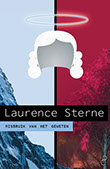


" readable and well-illustrated introduction to this subject.
... pioneering work "
Times Literary Supplement, 16 January 2009

Labyrinth of Digressions.
Tristram Shandy as Perceived and Influenced by Sterne’s Early Imitators.
BOSCH, René
Amsterdam/ New York, NY, 2007, 319 pp., ill.
€ 64 / US$ 86
ISBN: 9042022914
Labyrinth of Digressions
With their appearance during the 1760s, the five instalments of Laurence Sterne’s The Life and Opinions of Tristram Shandy, Gentleman caused something like a booksellers’ hype. Small publishers and anonymous imitators seized on Sterne’s success by bringing out great numbers of spurious new volumes, critical or ironic pamphlets, and works that in style and title express a congeniality with Tristram Shandy.
This study explores these eighteenth-century imitations as indicators of contemporary assumptions about Sterne’s intentions. Comparisons between the original, the first reactions, and a number of late eighteenth-century imitations, show that Tristram Shandy was initially read against the background of Augustan and Grub-street satire. The earliest imitators harked back to traditions of banter and folklore, bawdy and grotesque humour, pathetic stories and orthodox religiosity, reaffirming a pattern of moral and aesthetic values that was conservative for its time. Philosophical Sentimentalism appears to have been a late development.
It is also argued that, partly because of their bad reputation, some of the authors of forgeries and parodies had a greater influence on the original than the reviewers to whom Sterne is often said to have listened. The imitators followed leads and themes in the first instalments, developing them according to their own conception of Sterne’s project and the reasons for his success. As a consequence, they unintentially put a pressure on Sterne to alter his course, and even to abandon some of the narrative lines and themes he had set out for himself.
The literature section contains a chronological checklist of English eighteenth-century Sterneana.
" a richer study, filled with meaty discussions and pertinent insights. "
"Bosch builds his several arguments on detailed readings of these derivative texts and thus justifies the inclusion of much quoted material. He has amassed a great many titles, some never before explored…"
Eighteenth-Century Studies, Volume 43, No.1, Fall 2009

ISBN 90-804659-5-X
91 pagina's
Prijs (euro) 4,75
Dat is waar - Verdiepingskatern
Een lesboek bij een leesboek voor wie denkt dat hij niet denken kan
Vragen, opdrachten en achtergronden bij Menno Lievers' filosofische verhalenboek Dat is waar. Het verdiepingskatern haalt een aantal fameuze filosofische kwesties uit het leesboek naar voren en maakt kinderen bekend met het wijsgerig gebruik van termen als rationalisme, subject en object, determinisme en ethiek. Het is een uitgelezen leermiddel voor het filosofieonderwijs in de onderbouw van het VWO en bereidt voor op thema's behorend tot de domeinstof van het VWO-eindexamen filosofie. Het biedt daarnaast tal van aanknopingspunten voor klassikale debatten en socratische gesprekken.
Misbruik van het Geweten
Laurence Sterne
Misbruik van het geweten
Een belangrijk nieuw thema in het examenprogramma Filosofie voor het VWO is het sceptisch piëtisme, de houding van verlichte eerlijkheid in godsdienstzaken. Tim de Mey bespreekt in het examenboek Het voordeel van de twijfel de ideeën op dit gebied van de zeventiende-eeuwse filosoof Pierre Bayle.
In zijn inleidend essay bij Misbruik van het geweten schetst R.P.Bosch de Britse wortels van ditzelfde gedachtegoed. Met haar aanbeveling van een sceptische houding creëerde de Anglicaanse kerk van de zeventiende en achttiende eeuw een ontvankelijk publiek voor de werken van Locke, Berkeley en Hume – en voor een meesterwerk als Laurence Sternes Tristram Shandy.
Laurence Sterne (1713-1768) was schrijver, filosoof en dominee. Hij inspireerde experimentele schrijvers als James Joyce en Salman Rushdie. Maar ook een lange stoet filosofen, van Voltaire, Diderot en Nietzsche, tot Dennett, Rorty en Droit, heeft zich tot zijn werk aangetrokken gevoeld.
Aan deze uitgave van de klassieke kanseltekst Misbruik van het geweten heeft uitgeverij Panchaud een betekenisvol fragment uit Tristram Shandy toegevoegd. Voor lezers die nog onbekend zijn met deze Engelse schrijver is dit een prachtige gelegenheid om met Sternes fameuze intellectuele balanceerkunst kennis te maken. Kenners zullen dit boek zeker niet willen missen.
Open het menu
